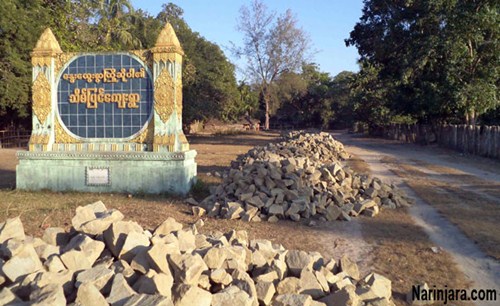Rathedaung: 26 farmers from Rathedaung Township in Arakan State have been sued by an army backed businessman for their efforts to retain their own shrimp and paddy farmlands that were confiscated by the army during the tenure of last military regime.
 The farmers who are now being sued by the businessman U Saw Aung Thein are from the villages of Paungsar, Naypukhan, Kyunchaung and Kaungrechaung that are situated on the bank of the Mayu River in Rathedaung Township.
The farmers who are now being sued by the businessman U Saw Aung Thein are from the villages of Paungsar, Naypukhan, Kyunchaung and Kaungrechaung that are situated on the bank of the Mayu River in Rathedaung Township.
“Now that the pro-democracy civilian government is in power, the farmers have appealed to the government to return their shrimp farms and paddy fields that were forcibly confiscated by the army. As the government has been delayed taking action with their appeals, they started to mend the broken dykes of those farmlands in order to make a living like before. Then, U Saw Aung Thein who has leased those lands from the western command has sued them”, said a local youth close to the farmers.
The farmers were said to be detained in the Laungchaung Police Station just after U Saw Aung Thein filed a lawsuit against them, but later were released on bail.
“The township court in Rathedaung started to hear their case on 9th of March and examined the plaintiff U Saw Aung Thein and two of his 16 witnesses, and then appointed the next hearing to be held on 19 and 28 March”, said the youth.
He said the police stepped up security around the court, searched and restricted the defendants and their two lawyers and dispelled the local people who crowded to listen to the hearing 20 yards away from the court on the first day of the hearing.
He added that the police however favored the plaintiff U Saw Aung Thein and his witnesses allowing him to hold his hand phone inside the courtroom though they did not allow the defendants’ lawyers to do so.
The plaintiff U Saw Aung Thein is a well-to-do businessman in downtown Rathedaung, and has been taking leases on confiscated farmlands from the western command after bribing army officers based in the area.
“He has to pay kyat 60 lakh a year to the western command that has confiscated those shrimp and paddy farms from the farmers and 40 lakh kyat to the army officers from the area as a bribe to assist him in gaining priority for those farms. And then he hires out the farms to the local farmers again with a rent of 200-250 lakh kyat and monopolizes the products of shrimp and paddy from the farmers with low prices as well”, said the youth.
According to him, total 1,800 acres of shrimp and paddy farmlands owned by the farmers in Rathedaung Township were forcibly confiscated by the western command in 1998.
A lawyer who is voluntarily giving legal assistance to the farmers told Narinjara that it would not be easy for the farmers to win the lawsuit that is directly connected to the western command and not to U Saw Aung Thein.
“Actually the main plaintiff in this lawsuit is not U Saw Aung Thein, but the western command. There would be wide criticism if the command sued the farmers. That is why it has asked its sycophant to file lawsuit against them. Judge, officials of the court as well as police are found favoring the plaintiff because the army, the most powerful institution, is on his side and there is little or no hope for the farmers to win the lawsuit”, said the lawyer.
The lawyer said the farmers traditionally owned the farmlands and tried to take back their farmlands because they have been in poverty since the lands were confiscated by the western command.
“80 villagers including those 26 farmers are now in great trouble because they have to face the lawsuit while they are already stricken by severe poverty and they are now totally helpless”, he said.
Sources said such lawsuit against the group of farmers was never heard of in their region before and interest in the lawsuit is growing among the local peoples as well.



